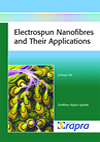Electrospun Nanofibres and Their Appications

This full colour Update covers all aspects of electrospinning as used to produce Nanofibres. It contains an array of colour diagrams, mathematical models, equations and detailed references. It will be invaluable to anyone who is interested in using this technique and also to those interested in finding out more about the subject.
Electrospinning is the cheapest and the most straightforward way to produce nanomaterials. Electrospun Nanofibres are very important for the scientific and economic revival of developing countries. Electrospinning was developed from electrostatic spraying and now represents an attractive approach for polymer biomaterials processing, with the opportunity for control over morphology, porosity and composition using simple equipment. Because electrospinning is one of the few techniques to prepare long fibres of nano- to micrometre diameter, great progress has been made in recent years.
It is now possible to produce a low-cost, high-value, high-strength fibre from a biodegradable and renewable waste product for easing environmental concerns. For example, electrospun nanofibres can be used in wound dressings, filtration applications, bone tissue engineering, catalyst supports, non-woven fabrics, reinforced fibres, support for enzymes, drug delivery systems, fuel cells, conducting polymers and composites, photonics, medicine, pharmacy, fibre mats serving as reinforcing component in composite systems, and fibre templates for the preparation of functional nanotubes.
Click here for further information.
Terms
While we only use edited and approved content for Azthena
answers, it may on occasions provide incorrect responses.
Please confirm any data provided with the related suppliers or
authors. We do not provide medical advice, if you search for
medical information you must always consult a medical
professional before acting on any information provided.
Your questions, but not your email details will be shared with
OpenAI and retained for 30 days in accordance with their
privacy principles.
Please do not ask questions that use sensitive or confidential
information.
Read the full Terms & Conditions.